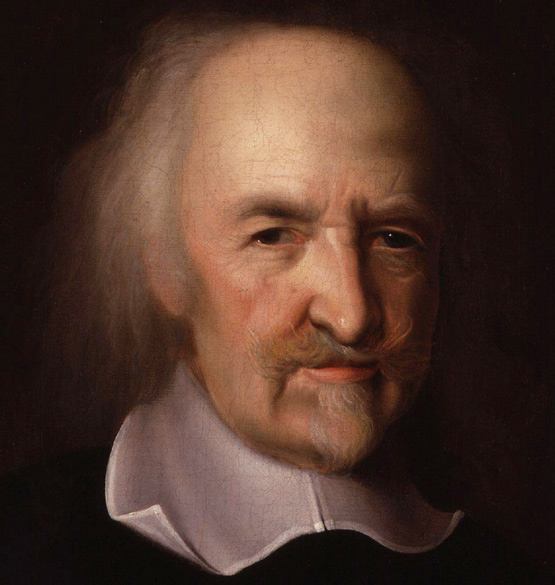The views expressed in our content reflect individual perspectives and do not represent the authoritative views of the Baha'i Faith.
The great Enlightenment philosophers—Hume, Hobbes, Kant, Locke and Rousseau—said that no human conscience could derive ought from is.

Thomas Hobbes
They called this influential idea the fact-value distinction, and it originated with the terrible religious wars taking place at the time. Many European nations battled over sectarian differences, and the Enlightenment philosophers said those wars arose out of completely unfounded beliefs—that because the ideas of human beings caused them, they weren’t worth fighting. This rising influence of the human conscience, which accompanied Newton’s scientific revolution, emphasized reason and analysis.
The fact-value distinction, their seminal concept, still rules much of modern philosophy today. It sees a fact as an objective truth discovered by science and reason; and a value as something we believe ought to be true. Fact: Nuclear weapons exist. Value: Nuclear weapons should never be used again. Fact: The Earth is one planet. Value: The Earth is one country.
That fundamental distinction between facts and values led philosophers to a parallel conclusion: science cannot determine the answer to questions of conscience. Science and rational thought concern themselves with what we know to be true; while values and morals concern themselves with what we would like to come true. This idea—that facts and values, science and religion occupy two completely different spheres of human activity—is sometimes called non-overlapping magisteria. The scientist and philosopher Stephen Jay Gould coined the term, and it attempts to separate the scientific realms of fact and theory from the religious realms of conscience, morality and meaning.
What do you think about the fact-value distinction? Do you believe that the worlds of meaning and moral human conscience are completely separate from the worlds of fact, science and theory, and never the twain shall meet? Or do you believe that these two spheres of human activity aren’t so absolute?
The Baha’i teachings have a strong point of view on the fact-value distinction. In Paris at the beginning of the 20th Century, Abdu’l-Baha spoke at length on this important subject, declaring the unity of truth:
There is no contradiction between true religion and science. When a religion is opposed to science it becomes mere superstition: that which is contrary to knowledge is ignorance. How can a man believe to be a fact that which science has proved to be impossible? If he believes in spite of his reason, it is rather ignorant superstition than faith. The true principles of all religions are in conformity with the teachings of science.
The Unity of God is logical, and this idea is not antagonistic to the conclusions arrived at by scientific study. All religions teach that we must do good, that we must be generous, sincere, truthful, law-abiding, and faithful; all this is reasonable, and logically the only way in which humanity can progress. All religious laws conform to reason, and are suited to the people for whom they are framed, and for the age in which they are to be obeyed.
Religion has two main parts: (1) The Spiritual; (2) The Practical.
The spiritual part never changes. All the Manifestations of God and His Prophets have taught the same truths and given the same spiritual law. They all teach the one code of morality. There is no division in the truth. The Sun has sent forth many rays to illumine human intelligence, the light is always the same.
The practical part of religion deals with exterior forms and ceremonies, and with modes of punishment for certain offences. This is the material side of the law, and guides the customs and manners of the people…
Now, all questions of morality contained in the spiritual, immutable law of every religion are logically right. If religion were contrary to logical reason then it would cease to be a religion and be merely a tradition. Religion and science are the two wings upon which man’s intelligence can soar into the heights, with which the human soul can progress. It is not possible to fly with one wing alone! Should a man try to fly with the wing of religion alone he would quickly fall into the quagmire of superstition, whilst on the other hand, with the wing of science alone he would also make no progress, but fall into the despairing slough of materialism. All religions of the present day have fallen into superstitious practices, out of harmony alike with the true principles of the teaching they represent and with the scientific discoveries of the time. Many religious leaders have grown to think that the importance of religion lies mainly in the adherence to a collection of certain dogmas and the practice of rites and ceremonies! Those whose souls they profess to cure are taught to believe likewise, and these cling tenaciously to the outward forms, confusing them with the inward truth.
Now, these forms and rituals differ in the various churches and amongst the different sects, and even contradict one another; giving rise to discord, hatred, and disunion. The outcome of all this dissension is the belief of many cultured men that religion and science are contradictory terms, that religion needs no powers of reflection, and should in no wise be regulated by science, but must of necessity be opposed, the one to the other. The unfortunate effect of this is that science has drifted apart from religion, and religion has become a mere blind and more or less apathetic following of the precepts of certain religious teachers, who insist on their own favourite dogmas being accepted even when they are contrary to science. This is foolishness, for it is quite evident that science is the light, and, being so, religion truly so-called does not oppose knowledge… I say unto you: weigh carefully in the balance of reason and science everything that is presented to you as religion. If it passes this test, then accept it, for it is truth! If, however, it does not so conform, then reject it, for it is ignorance!
Put all your beliefs into harmony with science; there can be no opposition, for truth is one. When religion, shorn of its superstitions, traditions, and unintelligent dogmas, shows its conformity with science, then will there be a great unifying, cleansing force in the world which will sweep before it all wars, disagreements, discords and struggles — and then will mankind be united in the power of the Love of God. – Abdu’l-Baha, Paris Talks, pp. 141-146.
















Comments
Sign in or create an account
Continue with Googleor